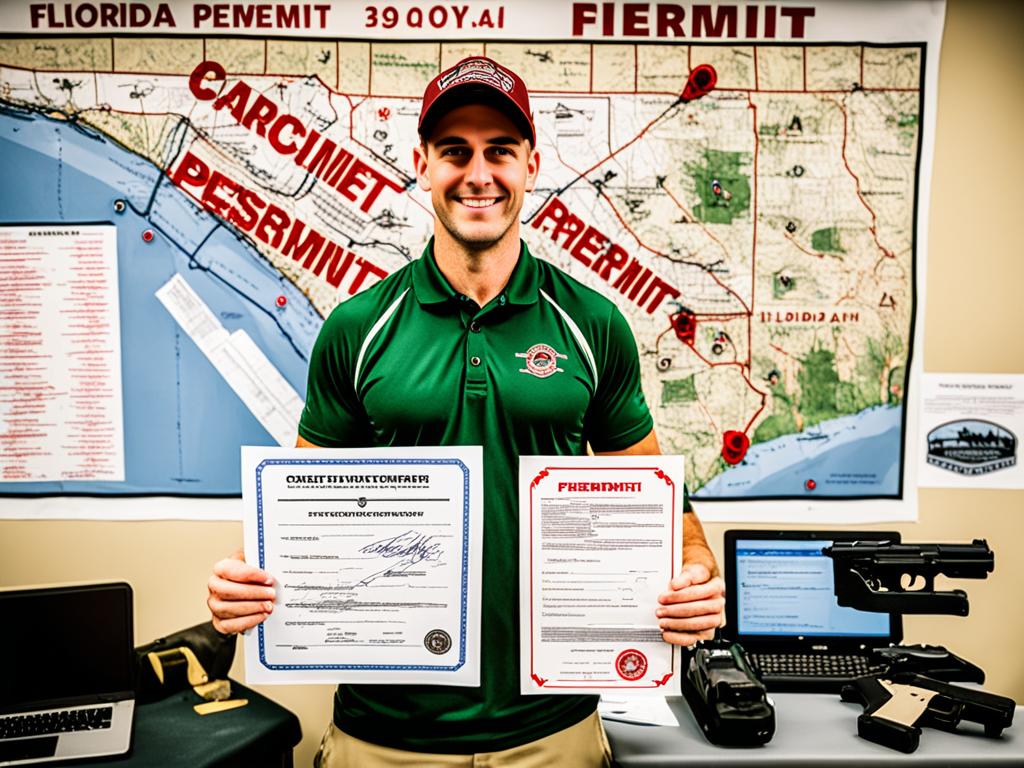Have you ever wondered how to legally keep a pet skunk or other exotic wildlife in Florida? Navigating the permit process can seem daunting, but it’s essential for those keen on owning non-domesticated animals.
To get a Class 3 Permit in Florida, you must use the Go Outdoors Florida (GOF) portal. The online application is mandatory, and paper applications aren’t accepted. This portal allows you to access and submit forms for your specific permit needs, whether for personal pet ownership or public exhibition. Start by creating an account on the GOF platform. You’ll receive login credentials via email shortly after.
The Florida Fish and Wildlife Conservation Commission (FWC) handles the review and approval process, typically taking 8 to 12 weeks. If you don’t receive your permit within this period, reach out to the FWC at cwapps@MyFWC.com to check on any delays or unanswered queries. Staying in touch through email ensures efficient communication and helps expedite your application.
Key Takeaways
- Apply through the Go Outdoors Florida portal; paper applications are not accepted.
- Typical processing time spans 8 to 12 weeks.
- For any queries or delays, contact the FWC at cwapps@MyFWC.com.
- Creating an account on the GOF platform is the first step to applying.
- Staying in touch through email ensures updates on your application status.
Understanding Class III Wildlife
Florida’s wildlife classification system includes Class I, Class II, and Class III types of animals. Class III wildlife, which falls under the broadest category, includes a wide array of non-domesticated animals that are neither listed under Class I or Class II nor categorized as Conditional or Prohibited species. Understanding the Class 3 Wildlife definition is essential for ensuring compliance with state regulations.
What is Class III Wildlife?
Class III wildlife includes many non-domesticated animals, ranging from small mammals to birds, reptiles, and amphibians. These animals could be either native or non-native to Florida, but do not fall under the higher risk categories of Class I and II. The Florida Fish and Wildlife Conservation Commission (FWC) defines these categories to ensure public safety and proper animal care.
Unlike exotic animals like caimans and venomous snakes that require stricter permits, Class III wildlife typically includes less dangerous species. However, it is illegal to keep injured, orphaned, or abandoned native wildlife as personal pets; these animals must be directed to permitted wildlife rehabilitators.
Common Class III Species
The common Class III species in Florida encompass a diverse group of wildlife. Mammals such as guinea pigs, hamsters, and squirrels, along with many birds and reptiles, fall into this classification.
| Common Class III Animals | Native or Non-Native to Florida |
|---|---|
| Guinea Pigs | Non-Native |
| Leopard Geckos | Non-Native |
| Parakeets | Non-Native |
| Squirrels | Native |
For those looking to own Florida native wildlife or exotic animals falling under Class III, it’s crucial to comprehend the specific regulations. This helps ensure legal compliance and the animals’ well-being.
Aspiring owners must complete a Personal Pet questionnaire and establish a proof of adequate caging facilities within 30 days of tentative approval. Additionally, applicants must ensure that the housing conditions for these animals do not pose a threat to the wildlife or the public.
Florida Class 3 Permit Requirements
Securing a Class 3 Permit in Florida involves fulfilling several detailed Florida Class 3 Permit requirements, including demonstrating adequate experience and providing suitable documentation. This ensures responsible ownership of exotic animals.
Experience and Documentation Needed
Applicants must present evidence of experience, particularly 1,000 hours for Class II wildlife like capuchin monkeys, which entails care, feeding, and handling. Moreover, references are crucial—at least two recommendation letters from a licensed individual in the desired category or a recognized institution must be submitted. Documenting this experience is mandatory for certain exotic species, prominently spider and woolly monkeys.
Online Application Process
The Go Outdoors Florida portal guides applicants through the online application process. This involves setting up an account, completing the necessary forms, and paying the required fees. For instance, a non-refundable fee of $140 is applicable for Class II wildlife permits. However, some Class III permits, such as those for personal pet ownership, are free of charge. Assistance tools like the GOF User Guide and FAQs are available on the website to help applicants.
Contact Information and Support
For queries and support, applicants can reach out via the provided email address or the Tallahassee-based mailing address, though email communication is preferred for efficiency. It is crucial for applicants to keep their contact information updated throughout the process to avoid any delays. In addition, applicants must provide a Captive Wildlife Critical Incident – Disaster Plan and ensure all documentation is up to date to comply with Class 3 Permit in Florida regulations.
| Permit Type | Requirements | Cost |
|---|---|---|
| Class II Wildlife | 1000 hours of experience, 2 reference letters | $140 |
| Class III Personal Pet | Personal pet questionnaire | No-Cost |
| Class III Exhibition/Public Sale | Facility inspection, experience documentation | $50 annually |
Class 3 Permit Application Process in Florida
The Class 3 Permit application process in Florida simplifies through the Go Outdoors Florida portal. You need to fill out specific forms that match the license type you’re applying for—whether it’s a Class III personal pet permit, an exhibition license, or a permit for venomous reptiles.
One crucial part of the application is the Captive Wildlife Critical Incident – Disaster Plan. This is mandatory for every applicant. The Florida Fish and Wildlife Conservation Commission demands thorough facility and experience-related forms. These must be submitted electronically to ensure compliance with state regulations for wildlife.
Getting a Class 3 Permit also involves documenting experience, especially if you’re dealing with species like Capuchin, Spider, or Woolly monkeys. For Class III wildlife, you must submit a Personal Pet questionnaire. Additionally, references are required for applicants wishing to keep Class I or II wildlife. Ensure that both references come from either licensed professionals or representatives of recognized organizations.
The process is entirely online via the Go Outdoors Florida (GOF) portal. This system also facilitates the application for other permits involving Captive Wildlife, Venomous Reptiles, and exhibition licenses. This online application for Class 3 Permit streamlines the entire workflow, promoting efficiency and ease of access.
| Application Requirement | Class II Wildlife | Class III Wildlife |
|---|---|---|
| Required Experience | 1000 hours | Experience documentation (for specific species) |
| Personal Pet Questionnaire | Not required | Required |
| Reference Letters | 2 references | 2 licensed references |
| Application Fee | $140 | Depends on the application |
| Disaster Plan | Mandatory | Mandatory |
By documenting experience and meeting all necessary requirements, you can successfully navigate the Class 3 Permit application process, whether it’s for a personal pet or a commercial venture. It ensures that you comply with Class 3 wildlife licensing and promotes responsible ownership.
How To Get A Class 3 Permit In Florida
Acquiring a Class 3 Permit in Florida involves a clear, step-by-step approach. This process starts with visiting the Go Outdoors Florida (GOF) platform. Here, you can initiate your digital application tailored to your specific needs. Whether pursuing a Free Personal Pet Permit or an Exhibition/Public Sale License, you must complete various forms and provide necessary documentation.
Firstly, create an account on the GOF portal. Ensure your contact details are accurate, particularly your email address, as this will be the main mode of communication with the Florida Fish and Wildlife Conservation Commission (FWC). After creating your account, you will receive login credentials via email. Use these to access the application forms that correspond to your requirements. For instance, you might need a personal questionnaire for pet permits or a captive wildlife inventory report if you’re dealing with venomous reptiles.
Once logged in, carefully complete all required forms. This includes documentation like experience with handling the specific types of wildlife or developing caging plans to ensure the safety of the exotic animal. For species such as capuchin monkeys, you must prove you have 1,000 hours of documented experience. Additionally, applicants must submit two reference letters, which are crucial for the approval process.
Expect to pay various fees depending on the type of permit. A Class 3 Permit in Florida cost ranges from free for the No-Cost Personal Pet Permit to $50 annually for the Exhibition or Public Sale License. If dealing with Class II wildlife, there is a $140 fee. Remember, the renewal fees are consistent with the initial application fees.
After submitting your forms and making the necessary payments, closely monitor your email for updates from the FWC. The processing time typically ranges from 8 to 12 weeks. If you haven’t received your permit by the anticipated date, proactively reach out via the provided email to check your application status. This vigilance ensures any delays due to unanswered questions or FWC backlogs are promptly addressed.
| Permit Type | Cost | Duration | Experience Required |
|---|---|---|---|
| Class III Personal Pet Permit | Free | Three years | None |
| Class III for Exhibition/Public Sale | $50/year | Five years | 1,000 hours |
| Class II Personal Use PPL | $140 | Annually renewed | 1,000 hours |
This comprehensive step by step guide for Class 3 Permit in Florida seeks to facilitate a seamless application journey. By adhering to these guidelines, you can efficiently navigate the process and secure your Class 3 wildlife licensing.
Is Having a Pilot License Helpful When Applying for a Class 3 Permit in Florida?
Having a pilot license might showcase strong responsibility and understanding of regulations, which could positively influence your application for a Class 3 Permit in Florida. By exploring resources on how to get pilot license, you can gain skills that demonstrate discipline and precision, potentially setting you apart during the permitting process.
Conclusion
In conclusion, navigating the process to secure a Class 3 Permit in Florida requires keen attention to detail, patience, and adherence to specific regulations. The entire procedure, from application to approval, is designed to ensure responsible wildlife ownership and compliance with Florida Class 3 Permit regulations.
Firstly, individuals must prepare adequately by accumulating any required experience and ensuring their facilities meet state guidelines. This preparation is crucial in meeting Florida Class 3 Permit guidelines and demonstrating the ability to responsibly handle wildlife. The application itself is done exclusively online through the Go Outdoors Florida portal, ensuring a streamlined submission process.
Furthermore, staying engaged in communication with the Florida Fish and Wildlife Conservation Commission (FWC) is essential throughout the application period. Regular checks on application status and prompt responses to any inquiries from the FWC will assist in avoiding unnecessary delays. By following these steps and providing the needed documentation, anyone can achieve the important milestone of securing a Class 3 Permit in Florida.

